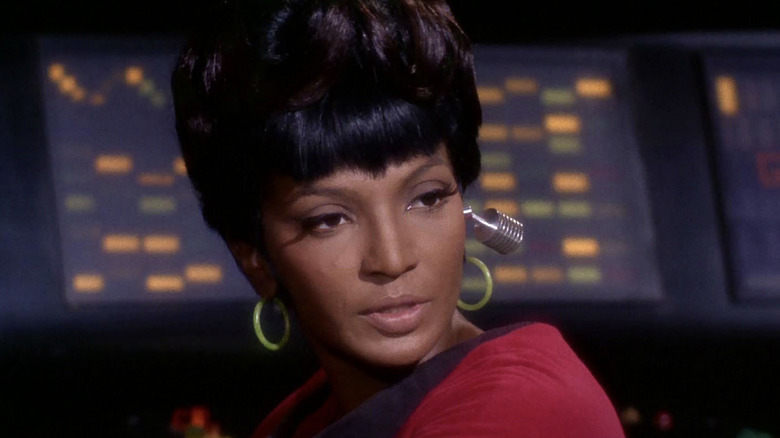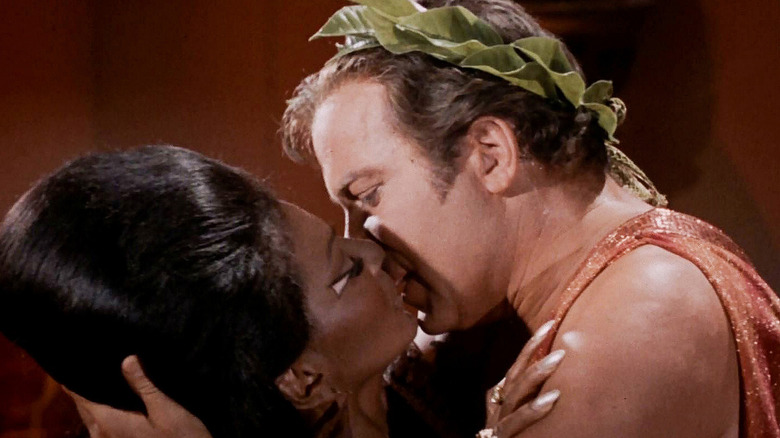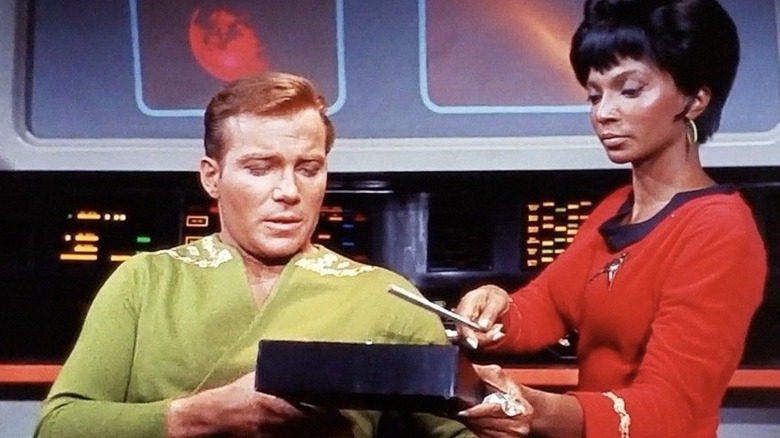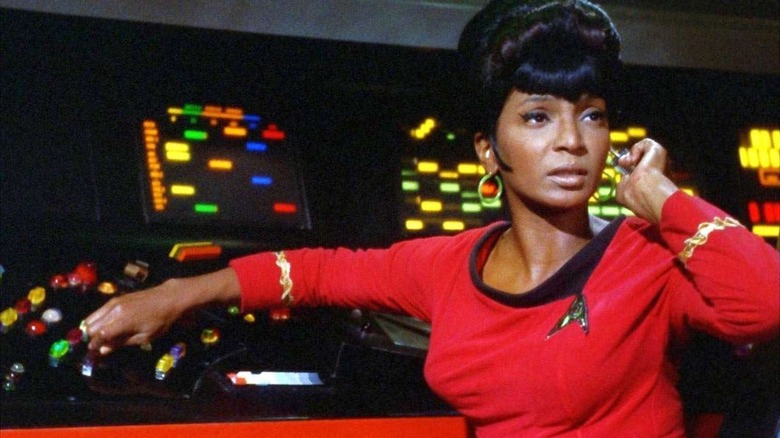William Shatner's Star Trek Screentime Came At The Cost Of Nichelle Nichols' Uhura
On July 30th of this year, Nichelle Nichols, the woman who brought the character of Lt. Nyota Uhura, died at 89 years old. Nichols' presence on "Star Trek: The Original Series" was revolutionary for its time, portraying a Black woman as part of an elite crew in a futuristic sci-fi setting. The character of Uhura was symbolic of the endurance of Black existence in a distant world. In many ways, Gene Roddenberry's series was defined by its forward thinking attitude and its willingness to break barriers, its setting directly representing a world where bigotry was left behind in pursuit of scientific progress.
While those values are certainly important for Trekkies to live by, it is also crucial to remember that the post-racial world of "Star Trek" onscreen was still shaped by society in the 1960s at the height of the civil rights movement, and for Nichols and other cast members from marginalized groups, like George Takei, that reality was much more complicated. The barrier-breaking interracial kiss between Uhura and William Shatner's Captain Kirk was a topic well discussed this year, but it is much less publicized that Shatner and Nichols' professional relationship was on much shakier ground. In many cases, Shatner's screentime as Kirk came at the expense of cutting time for Nichols' Uhura.
Nichols felt she was a glorified telephone operator
Famously, Nichols' once described her "Star Trek" role as a "glorified phone operator in space." She was frustrated with how little she had to do compared to her white male co-stars, especially when it came to the trio of Spock, Kirk, and Bones. She actually planned to quit the show after its first season, but Martin Luther King Jr. 's words of encouragement motivated her to stay aboard. MLK told Nichols, "For the first time on television, we will be seen as we should be seen, every day." Nichols learned that day that her own visibility on the show as a dignified and non-stereotyped Black woman was revolutionary in itself.
Unfortunately, Nichols' efforts for Uhura to continue to be present and visible amongst the Enterprise was a fight of its own. In her 1994 memoir, "Beyond Uhura," Nichols revealed that during production of "Star Trek," hers and many of her co-stars' scenes were often cut in favor of the show's bigger stars. She even exposed that network personnel were against her, going so far as to hide her fan mail from her so she couldn't use her star power to negotiate for a larger role. Nichols explained that this hostility was often attributed to William Shatner's behavior on set:
"Over the course of twenty-eight years, I'd witnessed Bill change from my hero to an insensitive, hurtful egotist, and had seen his callousness affect everyone around him, including myself."
Shatner's ego made the Star Trek set difficult
In "Beyond Uhura," Nichols detailed a confrontation she once had with Shatner, reflecting on the experience working with him.
"Bill, you cut people's lines, you took away their time. You really don't understand why Jimmy Doohan refuses to talk to you? Why I initially didn't want to talk to you? And why Walter is loath to talk to you? Is George going to talk to you?"
[...]I think I could have let it go there, except Bill retorted, "Oh?" Then with a dismissive laugh, he added, "Specifically, how did I p*** you off?"
Gee, I thought, Where do I begin? The cut lines? The scrapped scenes? The last-minute rewrites? The tantrums?
"Bill, what you did was insensitive. You were looking out for your career, but we were looking out for ours too. When you cut lines and took away our scenes, you hurt us as people and as actors. That you don't remember that, or you don't think it's very important only makes it worse."
Despite it all, Nichols' Uhura changed pop culture
Though "Star Trek: The Original Series" only lasted three seasons on NBC, its impact was immeasurable. Nichols would continually reprise her role of Uhura for "Star Trek: The Animated Series" and all six feature films between 1979 through 1991. While Nichols always envisioned more for Uhura, her presence in the franchise proved to be just as important on a cultural level as it was on a personal level for MLK. After "Star Trek" ended, Nichelle Nichols would go on to be an ambassador for diversity for NASA. Mae Jeminson, the first Black woman to travel to space, cited Nichols as one of her biggest inspirations.
A new take on Uhura would also be further developed by Zoe Saldana in JJ Abrams' reboot trilogy. In 2017, Sonequa Martin-Green would be cast as Michael Burnham, the first Black female lead of the franchise in "Star Trek: Discovery," paving the way for more racial diversity in the modern era of the franchise, all thanks to Nichols continued presence. "Star Trek" has outgrown centering primarily Shatner's Kirk, and for a series with such a firm stance on co-existence, this is only for the better.



